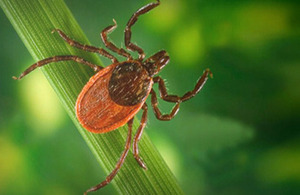PHE to host Lyme disease conference
Public Health England (PHE) will hold a conference on Lyme disease on Wednesday 9 October to discuss the latest research and developments in the field.

Tick
Lyme disease is a bacterial infection which is transmitted by tick bites, and can lead to serious health issues if left untreated.
The conference will provide an opportunity for partners from a wide range of disciplines to work together to explore patients’ needs, and discuss issues ranging from long-term symptoms and infections of the nervous system, to testing methodologies.
The Countess of Mar, who has an interest in Lyme disease and its treatment, will open the conference.
Speakers include:
- Dr Tim Brooks, head of PHE’s Rare and Imported Pathogens Laboratory
- Dr Emma Watson, Head of Service at the Scottish Toxoplasma Reference Laboratory and National Lyme’s Disease Testing Service
- Dr Matthew Dryden, a consultant microbiologist at Winchester’s Royal Hampshire County Hospital, who is working with PHE to set up the UK’s first a Lyme clinic
- representatives from Lyme disease support groups
The conference will interest clinicians, GPs, infectious disease specialists and members of the public with an interest in Lyme disease.
PHE’s Dr Tim Brooks, who is convening the conference, said:
Lyme disease is a rare illness but one which can cause considerable distress for those who are seeking a diagnosis or who suffer from long term complications. We are keen to share with professionals and the public the work we are doing to enhance and improve testing and treatment for Lyme disease, how we see the service we provide developing and give interested parties the opportunity to talk to us and share their concerns.
The event is held in conjunction with PHE’s medical entomology team (MEZE) based at Porton Down, who run the tick recording scheme and look into tick ecology, and the prevalence of different tick species in the UK. It will also set the scene for further events of this nature to continue to raise awareness on Lyme disease and tick bite prevention.